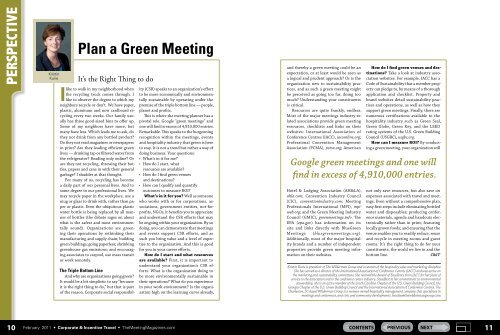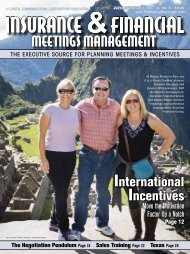Corporate & Incentive Travel - TheMeetingMagazines.com
Corporate & Incentive Travel - TheMeetingMagazines.com
Corporate & Incentive Travel - TheMeetingMagazines.com
You also want an ePaper? Increase the reach of your titles
YUMPU automatically turns print PDFs into web optimized ePapers that Google loves.
PERSPECTIVE<br />
Kristin<br />
Kurie<br />
Plan a Green Meeting<br />
It’s the Right Thing to do<br />
I<br />
like to walk in my neighborhood when<br />
the recycling truck <strong>com</strong>es through. I<br />
like to observe the degree to which my<br />
neighbors recycle or don’t. We have paper,<br />
plastic, aluminum and now cardboard recycling<br />
every two weeks. Our family usually<br />
has three good-sized bins to offer up.<br />
Some of my neighbors have more, but<br />
many have less. Which leads me to ask, do<br />
they not drink from any bottled product?<br />
Do they not read magazines or newspapers<br />
in print? Are they leading efficient green<br />
lives — drinking tap or filtered water from<br />
the refrigerator? Reading only online? Or<br />
are they not recycling, throwing their bottles,<br />
papers and cans in with their general<br />
garbage? I shudder at that thought.<br />
For many of us, recycling has be<strong>com</strong>e<br />
a daily part of our personal lives. And to<br />
some degree in our professional lives. We<br />
may recycle paper in the workplace, use a<br />
mug or glass to drink with, rather than paper<br />
or plastic. Even the ubiquitous plastic<br />
water bottle is being replaced by all manner<br />
of bottles (the debate rages on about<br />
what is the safest and most environmentally<br />
sound). Organizations are greening<br />
their operations by rethinking their<br />
manufacturing and supply chain; building<br />
green buildings; going paperless; shrinking<br />
greenhouse gas emissions; and encouraging<br />
associates to carpool, use mass transit<br />
or work remotely.<br />
The Triple Bottom Line<br />
And why are organizations going green?<br />
It would be a bit simplistic to say “because<br />
it is the right thing to do,” but that is part<br />
of the reason. <strong>Corporate</strong> social responsibil-<br />
ity (CSR) speaks to an organization’s effort<br />
to be more economically and environmentally<br />
sustainable by operating under the<br />
premise of the triple bottom line — people,<br />
planet and profits.<br />
This is where the meeting planner has a<br />
pivotal role. Google “green meetings” and<br />
one will find in excess of 4,910,000 entries.<br />
Remarkable. This speaks to the burgeoning<br />
recognition within the meetings, events<br />
and hospitality industry that green is here<br />
to stay. It is not a trend but rather a way of<br />
doing business. Your questions:<br />
• What’s in it for me?<br />
• How do I start, what<br />
resources are available?<br />
• How do I find green venues<br />
and destinations?<br />
• How can I qualify and quantify<br />
out<strong>com</strong>es to measure ROI?<br />
What’s in it for you? Well as someone<br />
who works with or for corporations, associations,<br />
government entities, not-forprofits,<br />
NGOs, it benefits you to appreciate<br />
and understand the CSR efforts that may<br />
be ongoing within your organization. By so<br />
doing, you can demonstrate that meetings<br />
and events support CSR efforts, and as<br />
such you bring value and a level of expertise<br />
to the organization. And this is good<br />
for you in your career efforts.<br />
How do I start and what resources<br />
are available? First, it is important to<br />
understand your organization’s CSR efforts.<br />
What is the organization doing to<br />
be more environmentally sustainable in<br />
their operations? What do you experience<br />
in your work environment? Is the organization<br />
high on the learning curve already,<br />
and thereby a green meeting could be an<br />
expectation, or at least would be seen as<br />
a logical and prudent approach? Or is the<br />
organization new to sustainability practices,<br />
and as such a green meeting might<br />
be perceived as going too far, doing too<br />
much? Understanding your constituents<br />
is critical.<br />
Resources are quite frankly, endless.<br />
Most of the major meetings industry-related<br />
associations provide green meeting<br />
resources, checklists and links on their<br />
websites: International Association of<br />
Conference Centres (IACC), iacconline.org;<br />
Professional Convention Management<br />
Association (PCMA), pcma.org; American<br />
Hotel & Lodging Association (AH&LA),<br />
ahla.<strong>com</strong>; Convention Industry Council<br />
(CIC), conventionindustry.<strong>com</strong>; Meeting<br />
Professionals International (MPI), mpiweb.org;<br />
and the Green Meeting Industry<br />
Council (GMIC), greenmeetings.info. The<br />
EPA (epa.gov) has information on its<br />
site and links directly with BlueGreen<br />
Meetings (bluegreenmeetings.org).<br />
Additionally, most of the major hospitality<br />
brands and a number of independent<br />
properties provide green meeting information<br />
on their websites.<br />
How do I find green venues and destinations?<br />
Take a look at industry association<br />
websites. For example, IACC has a<br />
Code of Sustainability that a member property<br />
can pledge to, by means of a thorough<br />
application and checklist. Property and<br />
brand websites detail sustainability practices<br />
and operations, as well as how they<br />
support green meetings. Finally, there are<br />
numerous certifications available to the<br />
hospitality industry such as Green Seal,<br />
Green Globe, Green Key, and the LEED<br />
rating systems of the U.S. Green Building<br />
Council (USGBC), usgbc.org.<br />
How can I measure ROI? By conducting<br />
a green meeting, your organization will<br />
Google green meetings and one will<br />
find in excess of 4,910,000 entries.<br />
not only save resources, but also save on<br />
expenses associated with travel and meetings.<br />
Even without a <strong>com</strong>prehensive plan,<br />
easy first steps include eliminating bottled<br />
water and disposables; producing conference<br />
materials, agenda and handouts electronically<br />
rather than in print; featuring<br />
locally grown foods; and ensuring that the<br />
venue enables you to readily reduce, reuse<br />
and recycle in meeting rooms and guest<br />
rooms. It’s the right thing to do for your<br />
constituents, the world we live in and the<br />
bottom line. C&IT<br />
Kristin Kurie is president of The Wilderman Group and a veteran of the hospitality sales and marketing discipline.<br />
She has served as a director of the International Association of Conference Centres (IACC) and was active on<br />
the marketing and sustainability <strong>com</strong>mittees. She received the Award of Excellence from IACC for her years of<br />
service to the association and to the conference center industry. Steadfast in her <strong>com</strong>mitment to environmental<br />
stewardship, she is an active member of the South Carolina Chapter of the U.S. Green Building Council, the<br />
Georgia Chapter of the U.S. Green Building Council and the International Association of Conference Centres. The<br />
Charleston, SC-based Wilderman Group is a woman-owned hospitality management <strong>com</strong>pany that specializes in<br />
meetings and conferences, and civic and <strong>com</strong>munity developments. kristin@thewildermangroup.<strong>com</strong><br />
10 February 2011 • <strong>Corporate</strong> & <strong>Incentive</strong> <strong>Travel</strong> • <strong>TheMeetingMagazines</strong>.<strong>com</strong><br />
11



